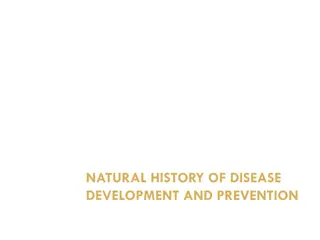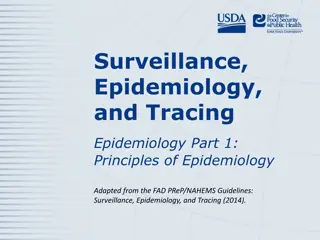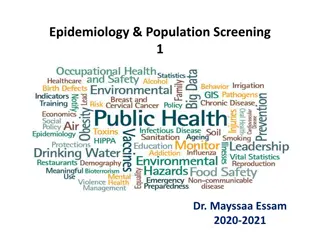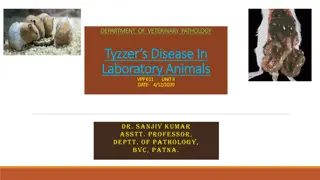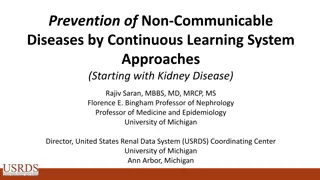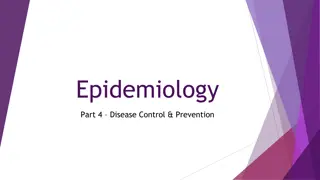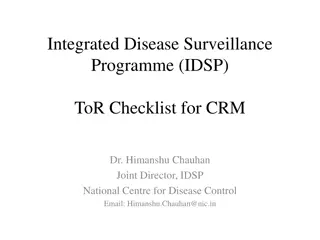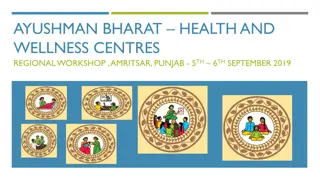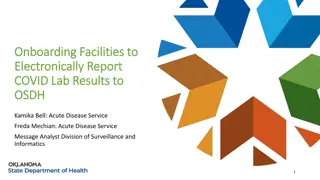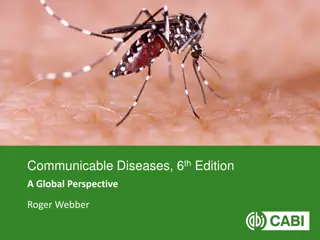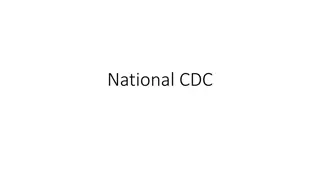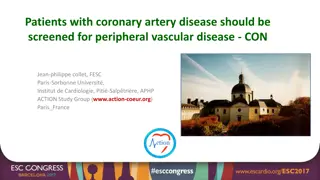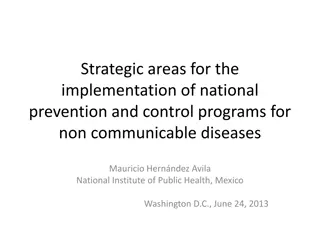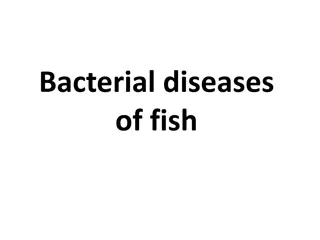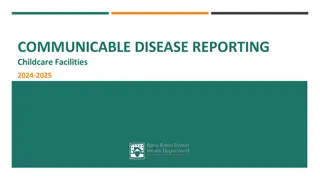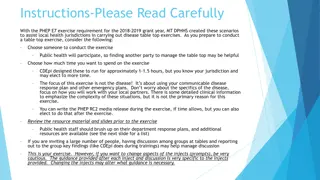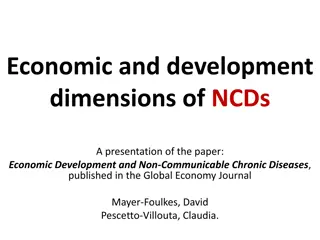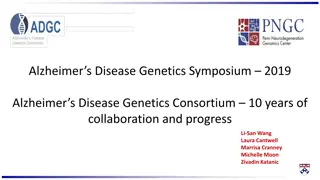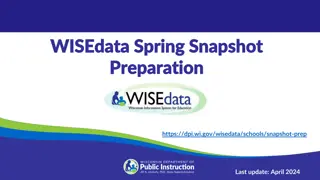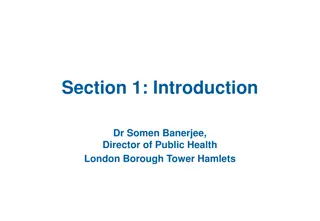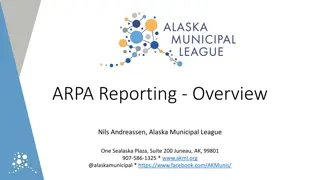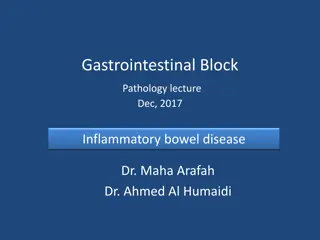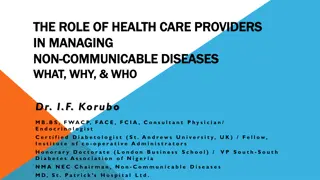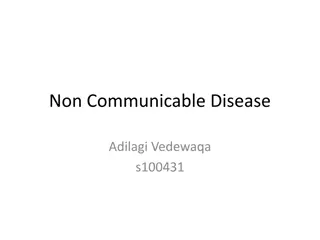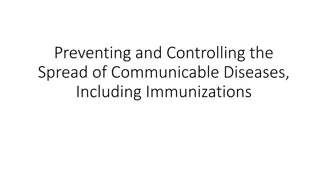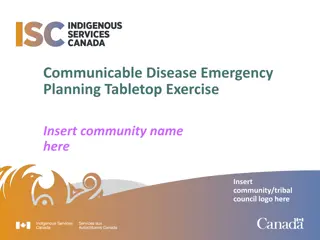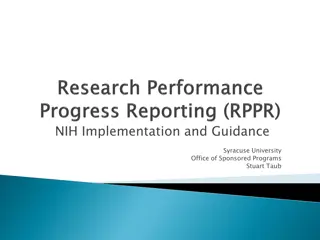ECC Social Value Reporting and Evaluation Framework
Essex County Council (ECC) has implemented a robust Social Value Reporting and Evaluation framework based on the Local Government Association's National TOMs method. This framework categorizes and assesses social value contributions in two parts - Value Score and Supporting Statement Score - to deri
3 views • 16 slides
Understanding Non-Communicable Diseases and Prevention Strategies
Medical officer Dr. Richard Ayebare discusses non-communicable diseases (NCDs), highlighting their impact, common types in Uganda, cardiovascular risks, and modifiable vs. non-modifiable risk factors. Learn about the definition, worldwide picture, complications, and prevention methods of NCDs for a
0 views • 17 slides
Understanding the Natural History of Disease Development and Prevention
The natural history of disease development outlines the progression of a disease in an individual without intervention, from exposure to outcome. Learning objectives include defining prevention terms, understanding disease severity, prevention levels, and intervention measures. Studying disease prog
4 views • 16 slides
At-Home HIV/STI Testing Pilot with Simple HealthKit
Communicable Disease Harm Reduction Section collaborated with Simple HealthKit to offer free HIV, syphilis, gonorrhea, chlamydia, and trichomoniasis testing to Wisconsin residents over 18 from August 25, 2023, to October 20, 2023. The aim was to make HIV and STI testing more accessible to those with
0 views • 23 slides
Principles of Epidemiology: Understanding Disease Occurrence and Surveillance
Epidemiology is the study of disease patterns, factors influencing disease occurrence, and the core functions of surveillance, field investigation, and analytic studies. It involves understanding disease characteristics, natural history, and evaluating the effectiveness of activities to mitigate dis
1 views • 25 slides
Understanding Epidemiology: Disease Distribution and Population Health
Epidemiology is the study of disease distribution in populations, analyzing patterns, determinants, and risk factors to understand and control various health conditions. It encompasses infectious diseases like cholera, nutritional disorders such as scurvy, cancers like childhood leukemia, and non-co
1 views • 16 slides
Insights into Tyzzer's Disease: An Overview of a Bacterial Infection in Laboratory Animals
Tyzzer's disease is an acute bacterial infection affecting rodents and rabbits, caused by Clostridium piliforme. Discovered in 1917 by Ernest Tyzzer, the disease is characterized by necrotic lesions in the caecal mucosa, liver, and heart. Initially known as Bacillus piliformis, it was later renamed
2 views • 21 slides
Continuous Learning Approach for Preventing Kidney Disease and Non-Communicable Diseases
Addressing the global health crisis of Non-Communicable Diseases (NCDs), particularly Kidney Disease, through comprehensive prevention strategies. Emphasizing the need for upstream primary prevention, utilizing surveillance systems, prediction analytics, and tailored messaging to drive awareness and
0 views • 13 slides
Understanding Disease Control and Prevention in Epidemiology
This article discusses disease control processes in epidemiology, including reducing disease incidence, duration, and transmission. It covers public policy interventions, elimination, eradication, and extinction of infectious agents. It also highlights preventable causes of disease and different lev
2 views • 10 slides
Integrated Disease Surveillance Programme (IDSP) Overview and Checklists
IDSP is a national health program launched in 2004 to monitor disease trends and respond to outbreaks. The program aims to strengthen disease surveillance systems and has specific checklists for service delivery and communicable diseases. The checklists include aspects like data utilization at distr
0 views • 9 slides
Enhancing Health Care Delivery through Ayushman Bharat Health and Wellness Centers
Ayushman Bharat Health and Wellness Centers aim to provide comprehensive primary health care services, including oral, mental, and geriatric care. These centers integrate service delivery to cover communicable and non-communicable diseases, focusing on preventive, curative, and rehabilitative care.
0 views • 39 slides
Streamlining Electronic Reporting of COVID Lab Results to OSDH
This documentation outlines the process of electronically reporting COVID lab results to the Oklahoma State Department of Health (OSDH). It covers the purpose, available options, specifications, formats, and the onboarding and testing process, aiming to accelerate the reporting of healthcare facilit
0 views • 9 slides
Overview of 1099 Reporting Systems
The 1099 Reporting Systems consist of MINC, EARN, and SPPS, which are used for IRS 1099 reporting purposes. These systems handle transactions and generate Form 1099 for recipients based on predefined criteria. Taxpayers are responsible for accurate reporting to the IRS, with reporting thresholds set
0 views • 15 slides
Understanding Communicable Diseases: A Global Perspective
Explore the dynamics of communicable diseases in the 6th edition of "Complimentary Teaching Materials - A Global Perspective" by Roger Webber. Learn about epidemic vs. endemic diseases, incubation periods, population dynamics, herd immunity, mathematical models for disease control, and various types
0 views • 13 slides
National Centre for Disease Control and Prevention (NCDC) in Saudi Arabia
The National Centre for Disease Control and Prevention (NCDC) in Saudi Arabia was established to address public health challenges through a multifactorial approach. By preventing and controlling communicable and non-communicable diseases, monitoring population health, and fostering public health sol
0 views • 8 slides
UNEP Support for Improving UNCCD Reporting Procedures
UNEP has been providing support since 2010 to enhance the reporting processes of the UNCCD, focusing on streamlined funding approaches, technical assistance, and capacity building. Key outcomes include the development of reporting tools, online reporting systems, and building credible data from coun
0 views • 14 slides
Climate Change Monitoring, Reporting, and Verification (MRV) Training Session Overview
This document outlines the purpose and reporting requirements for the development of a Climate Change Monitoring, Reporting, and Verification (MRV) system, focusing on projections and scenarios. It highlights the importance of collecting information for climate mitigation, assisting Serbia in meetin
0 views • 19 slides
Transitioning to Incident-Based Crime Reporting: Enhancing Transparency and Accountability
Anytown Police Department (APD) is leading the transition from Summary Reporting to Incident-Based Reporting through the National Incident-Based Reporting System (NIBRS). This change promotes transparency, provides detailed crime data to the public, and improves statewide and national crime statisti
3 views • 17 slides
Screening for Peripheral Vascular Disease in Patients with Coronary Artery Disease
Patients with coronary artery disease should be screened for peripheral vascular disease as it is a frequent integrator of global cardiovascular risk. The association of atherosclerosis in various arterial diseases highlights the importance of identifying multisite artery disease. The prevalence and
0 views • 23 slides
Insights into Structured Reporting Practices in Colorectal Cancer Imaging
A survey conducted by Dr. Eric Loveday at North Bristol NHS Trust revealed the current landscape of structured reporting in MRI and CT scans for rectal and colon cancer. Results indicate a positive outlook towards implementing national standards for structured radiology reporting, with an emphasis o
0 views • 7 slides
Implementing Strategic Areas for Non-Communicable Disease Prevention
Implementation of national prevention and control programs for non-communicable diseases is crucial for sustainable healthcare systems. Collaborating with multidisciplinary groups and shifting advocacy paradigms towards human rights and social determinants of health are essential. A transformation i
1 views • 20 slides
Human Disease Symptom Network: Understanding Disease Relationships Through Symptoms and Genes
The Human Disease Symptom Network (HSDN) is constructed using a large-scale medical bibliographic records database to form a network of human diseases based on symptom similarities. By integrating disease-gene associations and protein-protein interaction data, correlations between symptom similarity
0 views • 37 slides
Understanding Bacterial Diseases of Fish: Columnaris Disease Overview
Columnaris disease, also known as Saddleback disease, is a common bacterial infection in fish that is often brought about by poor handling and high stress levels. This disease manifests as tail and fin rot, leading to rapid fish mortality. The causative organism, Cytophaga (formerly Flexibacter), is
0 views • 21 slides
Managing Communicable Disease Reporting in Childcare Facilities
Michigan law requires schools and childcare centers to report specific diseases promptly to the local health department. Reporting helps identify disease trends, outbreaks, and epidemics, enables preventative measures, aids in resource allocation, and supports disease surveillance efforts. Guideline
0 views • 18 slides
Disease Tabletop Exercise: Suspected Tuberculosis Response Plan
Local health jurisdictions in Montana are preparing for disease tabletop exercises focusing on activating emergency response plans for suspected tuberculosis cases. The exercise aims to engage public health partners, clarify response roles, and identify strengths and gaps in emergency preparedness p
0 views • 49 slides
Economic Development and Non-Communicable Diseases: Analyzing the Impact
This paper explores the economic dimensions of Non-Communicable Diseases (NCDs) such as alcohol, tobacco, junk food, and lack of exercise, which are largely preventable factors affecting economic development. Key concepts like unwholesome goods, demand and supply irrationality, and market power are
0 views • 22 slides
Decoding Genetics: Insights from Alzheimer's Disease Symposium to Type 2 Diabetes Study
Explore the latest findings from the Alzheimer's Disease Genetics Symposium 2019 on disease mechanisms, drug targets, and genetic pathways. Dive into the progress made by the Alzheimer's Disease Genetics Consortium over the past decade. Transition to a Genome-Wide Association Study uncovering suscep
0 views • 42 slides
Simpler Systems Reporting Pilot for Financial Data Enhancement
The Simpler Systems Reporting Pilot is underway to enhance financial data reporting at the university campus. Led by Vice President Ryan Nesbit's team, this initiative aims to improve University-wide financial reporting mechanisms and accessibility to data through the Simpler tool. The pilot include
0 views • 5 slides
Overview of WISEdata Snapshot Preparation and Reporting Requirements
The WISEdata Snapshot Preparation provides crucial details on data entry, validation, and reporting processes for educational institutions. It outlines the importance of accurate data collection for federal reporting, public reporting, and funding determinations. Additionally, the Snapshot Reporting
0 views • 41 slides
Ensuring Chemical Reporting and Preparedness at the DEQ
The Chemical Reporting and Preparedness section at the DEQ focuses on regulations under EPCRA, prompted by incidents like the Bhopal tragedy. EPCRA covers Tier II reporting, spill reporting, LEPCs, State Emergency Response Commission, and Oklahoma Hazardous Materials Emergency Response Commission. T
0 views • 17 slides
Liver Disease Burden in Tower Hamlets
Dr. Somen Banerjee, Director of Public Health in London Borough Tower Hamlets, highlights the concerning liver disease mortality rates in the area, with high incidence of cirrhosis, cancer, and hepatitis B and C. The data reveals a significant burden of liver diseases such as Non-Alcoholic Fatty Liv
0 views • 18 slides
ARPA Reporting Overview and SLFRF Guidelines in Alaska
This document outlines the reporting overview for the ARPA (American Rescue Plan Act) and specific guidelines for the Coronavirus State and Local Fiscal Recovery Fund (SLFRF) in Alaska. It covers acceptance, use, and reporting of funds, as well as designating staff roles for managing reports. The co
2 views • 22 slides
Understanding Inflammatory Bowel Disease: Crohn's Disease and Ulcerative Colitis
Inflammatory Bowel Disease (IBD) encompasses Crohn's disease (CD) and ulcerative colitis (UC), chronic conditions with immunologic basis. This article delves into the epidemiology, pathophysiology, and differences between CD and UC, highlighting clinical features, pathology, and complications like a
0 views • 42 slides
Managing Non-Communicable Diseases: Role of Health Care Providers
Non-communicable diseases (NCDs) like cardiovascular diseases, cancers, chronic respiratory diseases, and diabetes mellitus pose significant health challenges globally. This overview delves into the definition, epidemiology, and management strategies of NCDs, emphasizing the critical role of health
0 views • 18 slides
Understanding Non-Communicable Diseases and Global Action Plans
Non-communicable diseases (NCDs), such as cardiovascular diseases, cancers, chronic respiratory diseases, and diabetes, pose a major health threat globally, with 38 million deaths yearly. The Global Action Plan aims to reduce premature mortality from NCDs by 2025 through specific targets, including
0 views • 16 slides
Feedback Analysis on Medication Incident Reporting in Hospitals
Feedback received from IMSN members on NIMS and incident reporting revealed various issues affecting the rates at which staff report medication incidents/near misses within hospitals. Major themes included staffing numbers and turnover, pharmacist involvement in incident reporting, clinical pharmacy
0 views • 12 slides
Understanding and Preventing Communicable Diseases
Communicable diseases, also known as contagious or infectious diseases, are caused by germs such as viruses, bacteria, fungi, and parasites. These illnesses spread from person to person through various means like body fluids and can have different treatment approaches. It is essential to know how th
0 views • 34 slides
Importance of Wildland Fire Reporting to the Fire Community
Wildland fire reporting plays a critical role in providing accurate data for effective fire management. Defined state fires and challenges in reporting impact funding, risk management, and agency support. Comprehensive reporting like the Wildland Fire Occurrence Reporting for Massachusetts is essent
0 views • 6 slides
Community Emergency Planning Tabletop Exercise
This tabletop exercise focuses on preparing communities for communicable disease emergencies by understanding the nature of communicable diseases, emergencies, and tabletop exercises. Participants will discuss how communicable diseases spread, the characteristics of a communicable disease emergency,
0 views • 11 slides
Streamlining Research Progress Reporting for NIH Awards
Research Performance Progress Report (RPPR) is a standardized mechanism to facilitate interim progress reporting for NIH-funded projects, aiming to enhance consistency and minimize administrative burdens. It replaces the eSNAP process for certain types of awards and fellowship grants. RPPR includes
0 views • 12 slides


